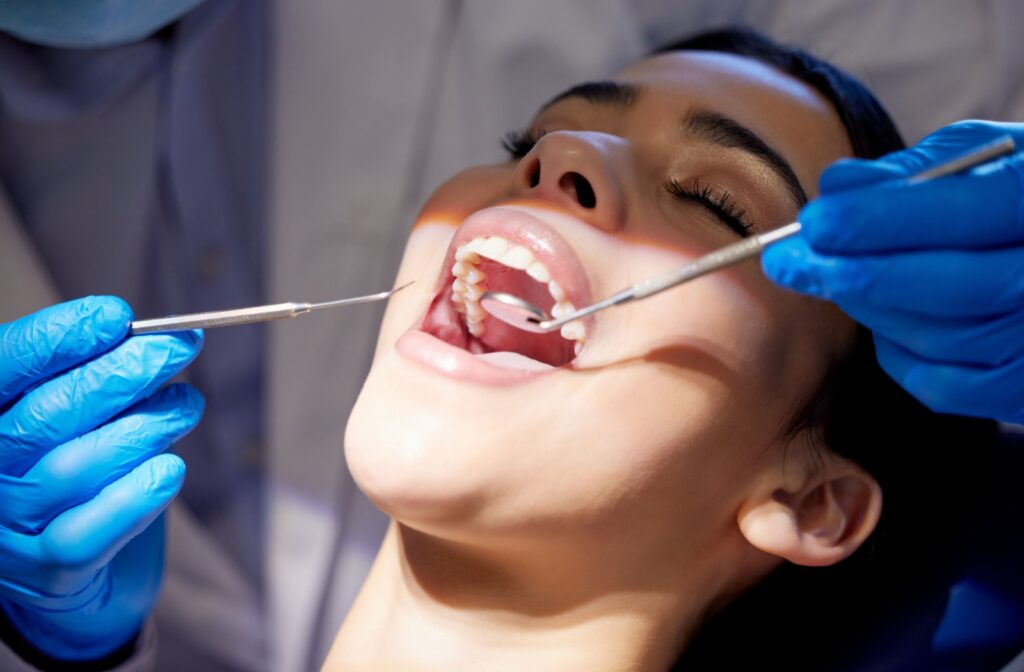Brushing and flossing at home are important—but they’re not enough on their own. Regular professional dental cleanings help prevent gum disease, catch early signs of decay, and remove buildup that brushing can’t reach.
These routine visits don’t just keep your smile looking good—they help protect your long-term oral health. When skipped, small problems can quietly become more serious, potentially leading to discomfort, damage, or costly treatments later on.
Why Are Dental Cleanings Important?
Even with meticulous brushing and flossing, every smile has hard-to-reach areas that can harbor plaque. Left unchecked, plaque hardens into tartar, which can’t be removed with your regular toothbrush and floss. Over time, this buildup contributes to gum disease, cavities, and other oral complications.
Regular cleanings help keep these issues from spiralling out of control. Here’s why dental cleanings are a good practice:
- Plaque and tartar removal: Removing stubborn tartar prevents gum disease and tooth decay that daily brushing might miss.
- Early detection of dental issues: Professional cleanings help identify cavities, gum inflammation, or enamel wear before they become costly concerns.
- Personalized oral care tips: Dentists and hygienists provide advice tailored to your oral health needs, including brushing and flossing techniques.
- Long-Term Cost Savings: Preventive care can help reduce the need for invasive and expensive treatments in the future.
Ultimately, cleanings do more than keep your teeth in good shape. They can leave you with a healthier mouth and a lower risk of larger health issues down the line.
What Happens During a Dental Cleaning?
Professional cleanings may sound intimidating, but they’re designed with your comfort and oral health in mind. Here’s a step-by-step look at what you can expect during your visit:
Examination
Your dentist or hygienist begins with a thorough examination of your teeth and gums. This initial check helps identify potential problems such as gum inflammation, cavities, or worn-down enamel.
Plaque & Tartar Removal
Using specialized tools, your hygienist carefully removes plaque and tartar buildup from around your gum line and between your teeth. This step targets areas you might find challenging to clean with your toothbrush at home.
Polishing
Once plaque and tartar are removed, your teeth are polished using a high-powered brush and gritty toothpaste. This process helps remove surface stains and gives your teeth that smooth, fresh feel.
Optional Fluoride Treatment
Depending on your needs, the final step may involve a fluoride treatment, which strengthens your teeth and provides added protection against cavities.
Personalized Oral Care
Your dental professional wraps up your cleaning by sharing tips and recommendations to help you maintain great oral health between visits.

The Many Benefits of Dental Cleanings
Professional dental cleanings do more than clean your teeth. They can provide both short-term and long-lasting benefits by improving your smile and overall well-being:
- Preventing cavities: Cleanings are helpful for removing plaque, which is the leading cause of tooth decay.
- Reduce risk of gum disease: Tartar buildup inflames gums, which can lead to gingivitis or periodontal disease.
- Brighten your smile: Surface stains caused by coffee, tea, or wine can be polished away during a deep cleaning, leaving your teeth brighter and fresher.
- Combat bad breath: Removing bacteria buildup during cleaning helps eliminate persistent bad breath.
How Often Should You Schedule a Dental Cleaning
For most individuals, dentists recommend a cleaning and checkup every six months. However, your needs may vary depending on factors like your oral health history and lifestyle.
You may benefit from cleanings more frequently if:
- You have experienced gum disease or frequent cavities.
- You’re prone to rapid tartar buildup.
- You’re managing health conditions like diabetes that can affect oral health.
Work with your dentist to determine the cleaning schedule that’s right for you.
What Happens If You Skip a Dental Cleaning
Skipping dental cleanings may seem like no big deal, but even missing just one or two appointments can leave your oral health vulnerable. Here’s what could happen:
- Risk of gum disease: Tartar buildup can lead to gum inflammation and, eventually, periodontitis. Advanced gum disease can cause gum recession, loose teeth, and even tooth loss.
- Cavities & tooth decay: Without regular cleaning, bacteria can thrive, increasing your risk of cavities.
- Persistent bad breath: Skipping cleanings allows plaque and bacteria to accumulate, causing bad breath that isn’t easily masked by mouthwash.
- Higher long-term costs: Avoidable issues like gum disease or decay can result in bigger dental bills for treatments like root canals or extractions.
Skipping cleanings doesn’t just impact your oral health; it can impact your overall well-being. Regular cleanings are an investment in a happier, healthier smile.
Make Your Smile a Priority
Taking care of your teeth is about more than just aesthetics. It’s about protecting your overall health, preventing future complications, and maintaining confidence in your smile.
If it’s been a while since your last cleaning, now is a great time to get back on track. At Marks Dentistry, we help make dental cleanings easy, approachable, and stress-free for every patient. Our experienced team is here to deliver a welcoming experience tailored to your needs.
Book your next cleaning today with Marks Dentistry and take the next step toward a healthier, happier smile!




